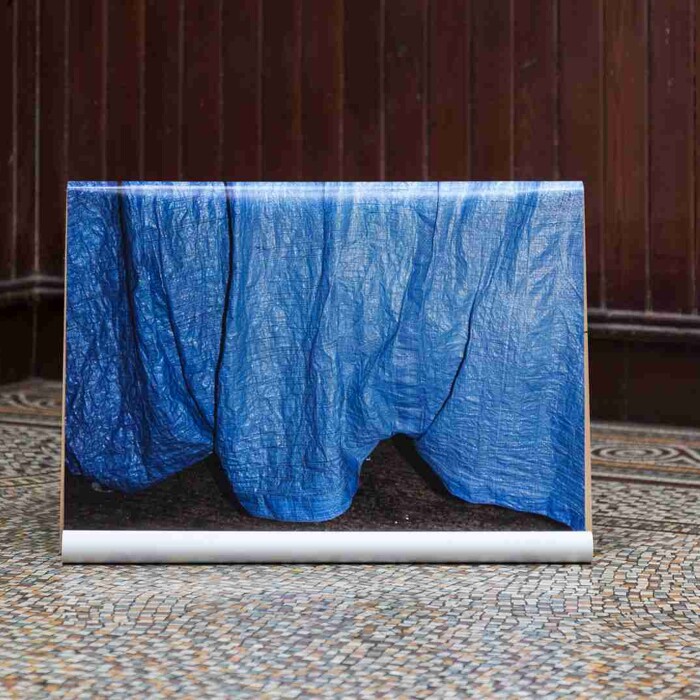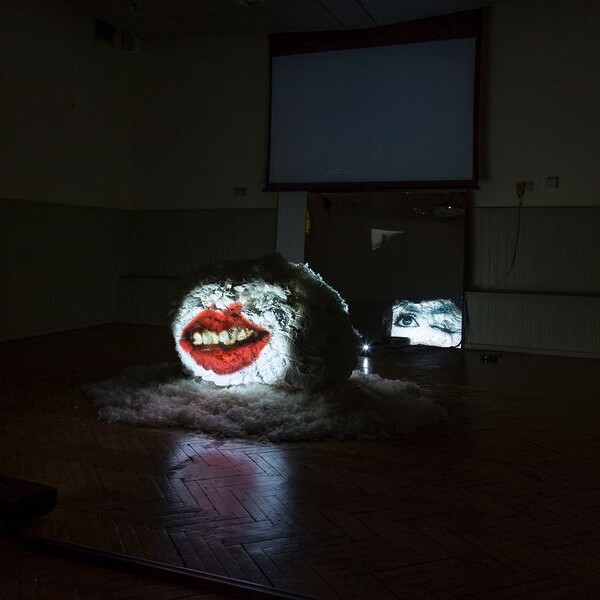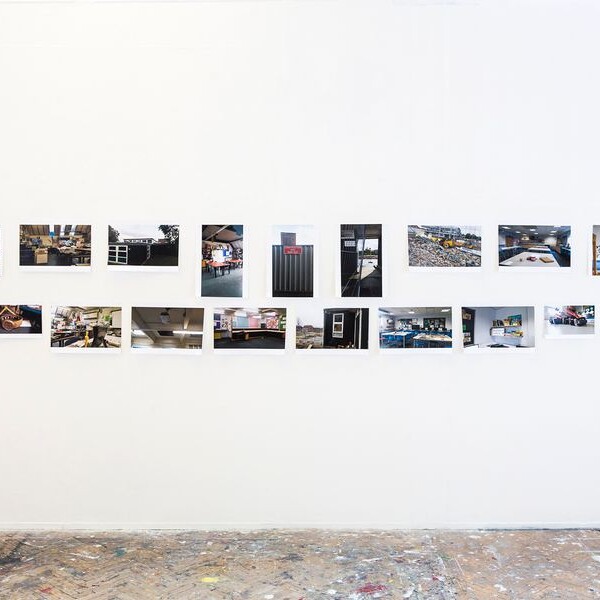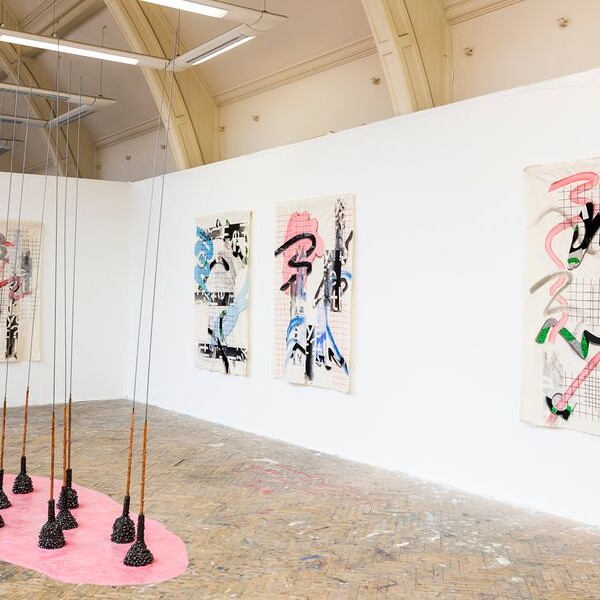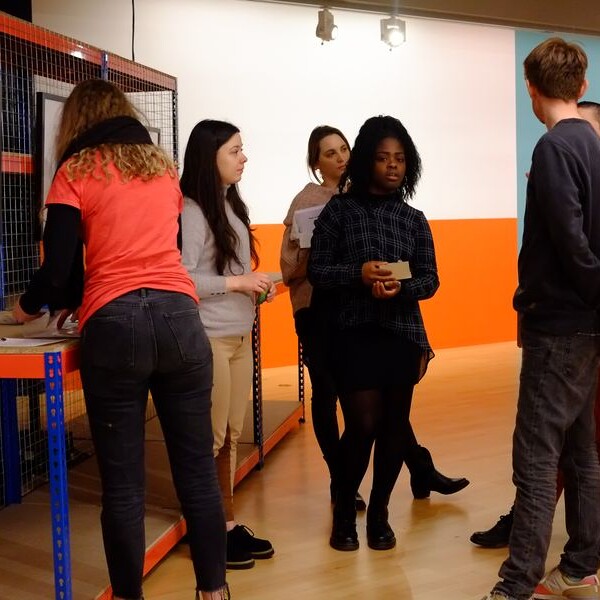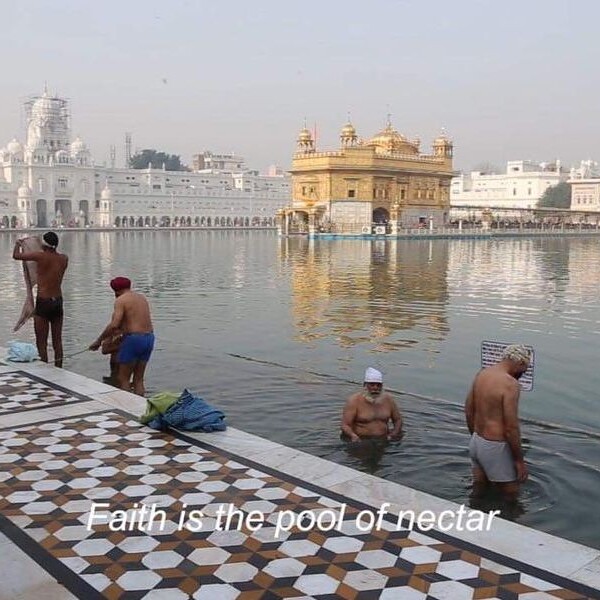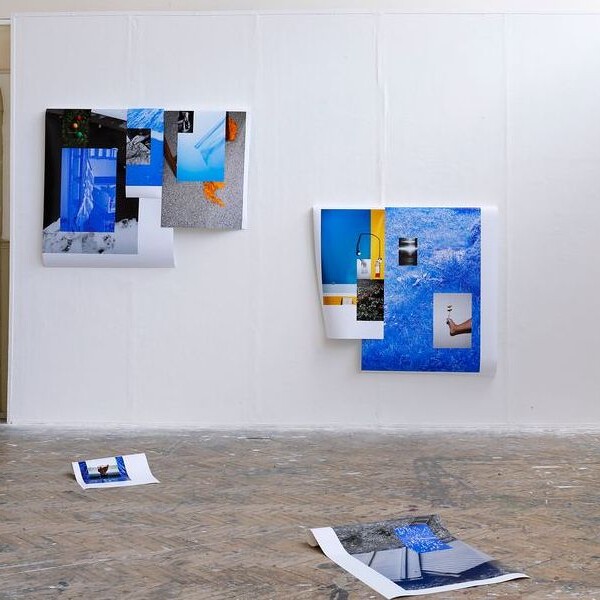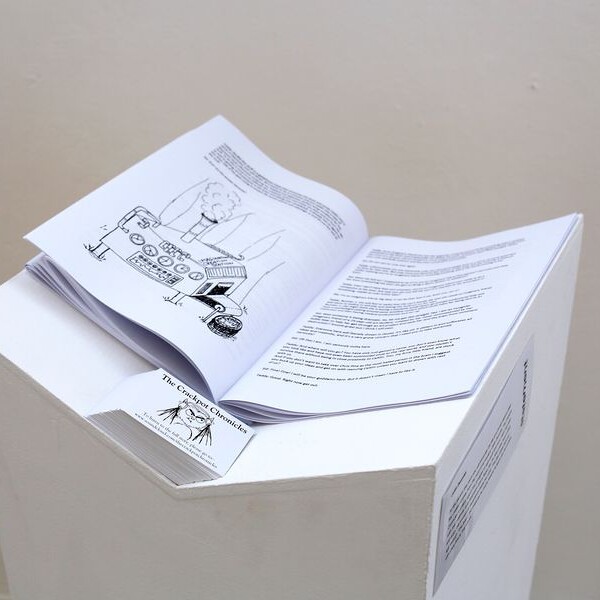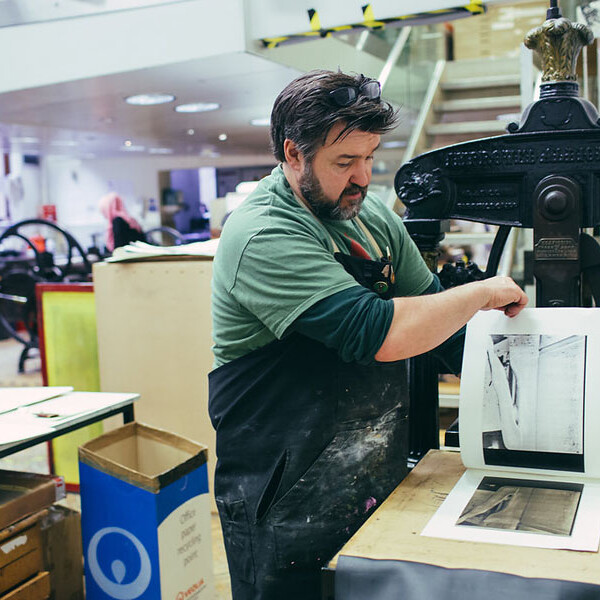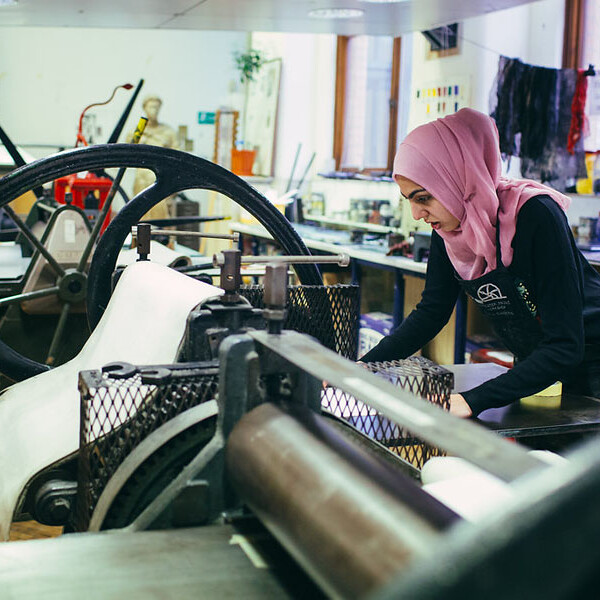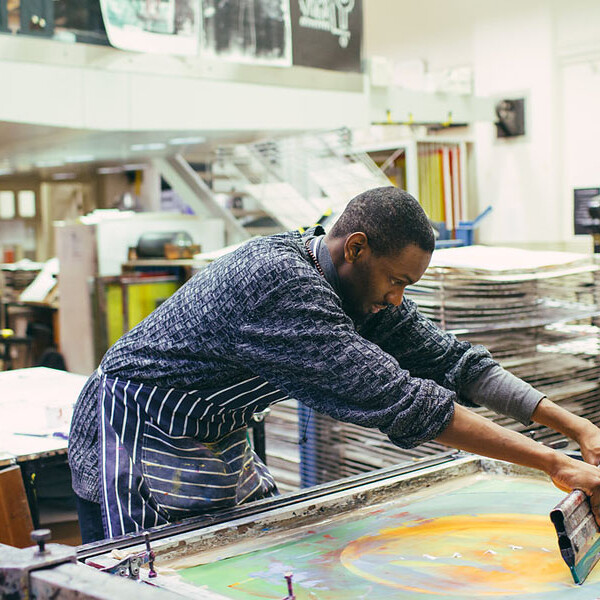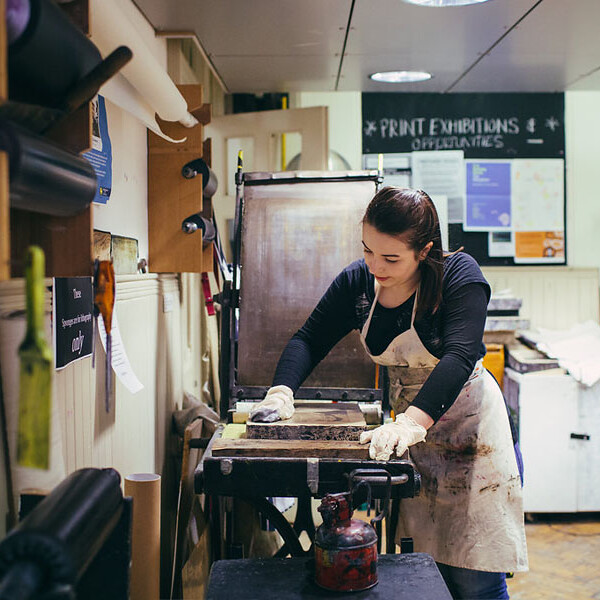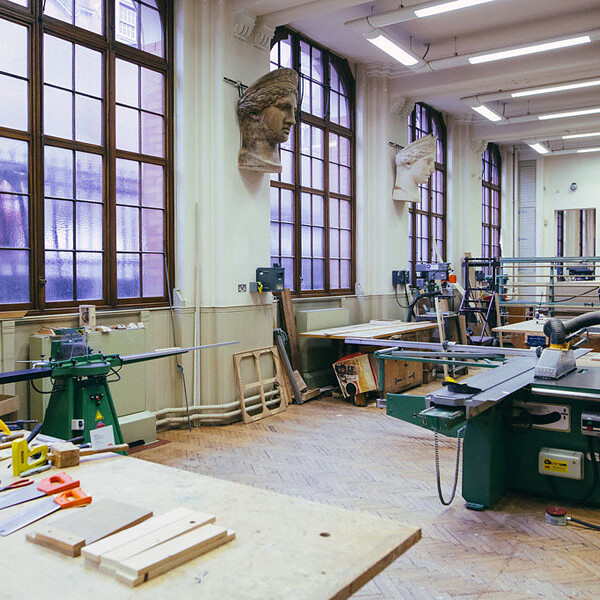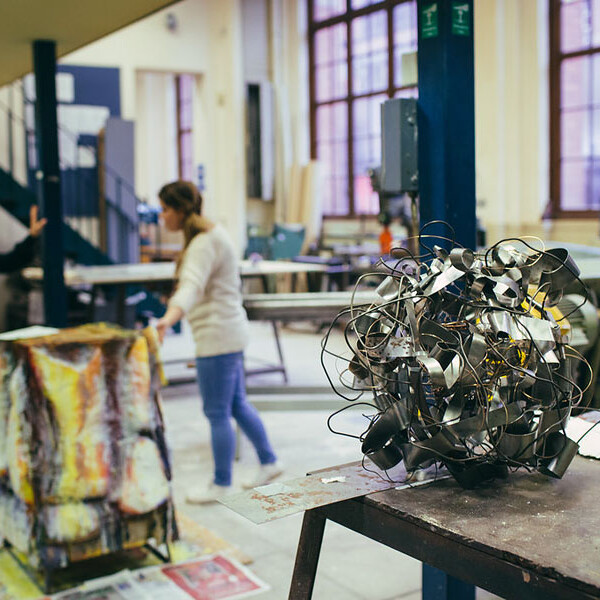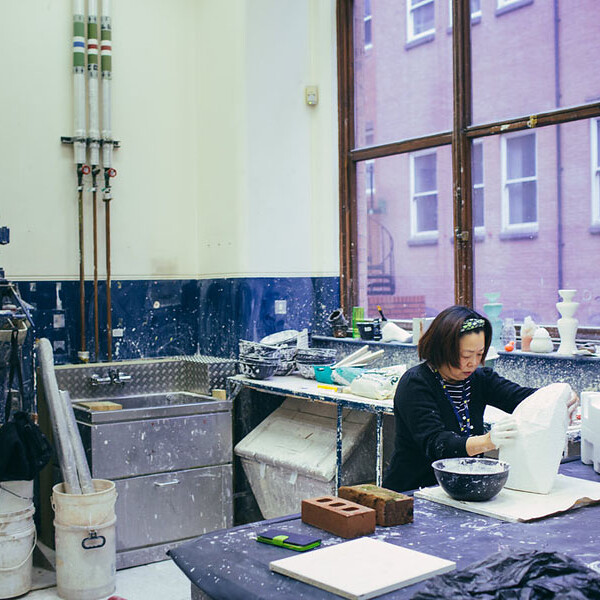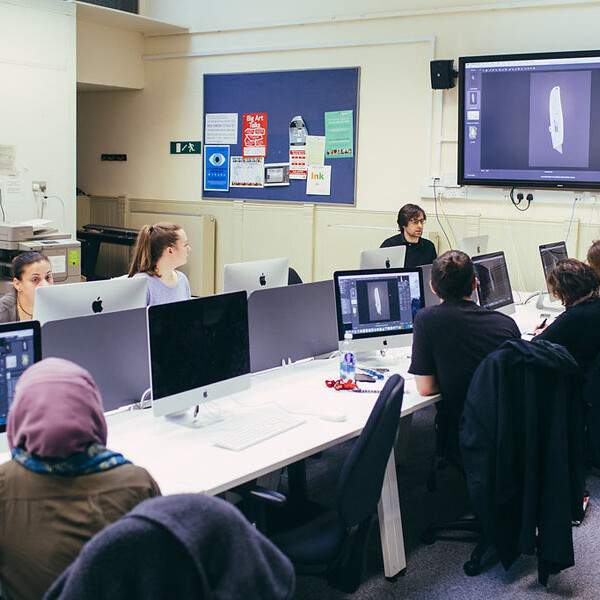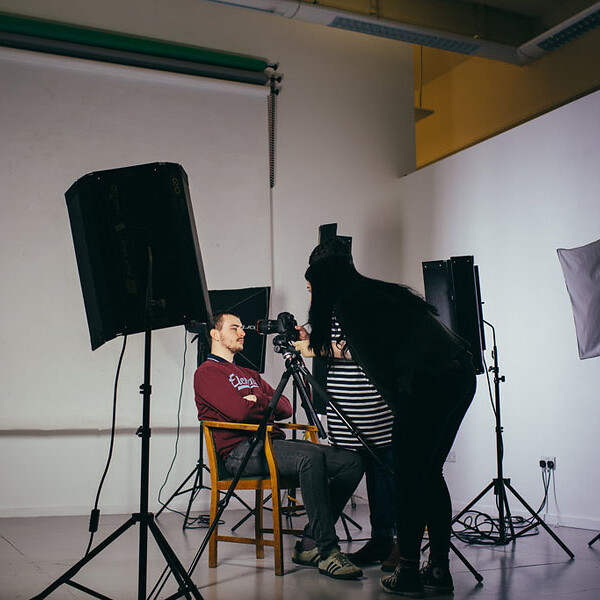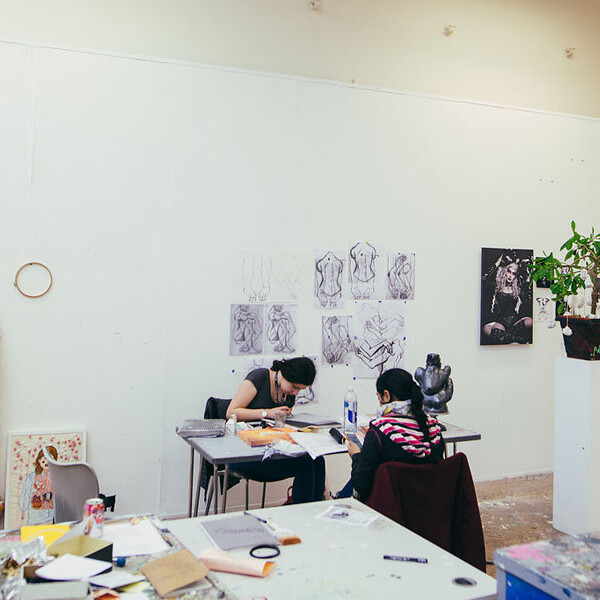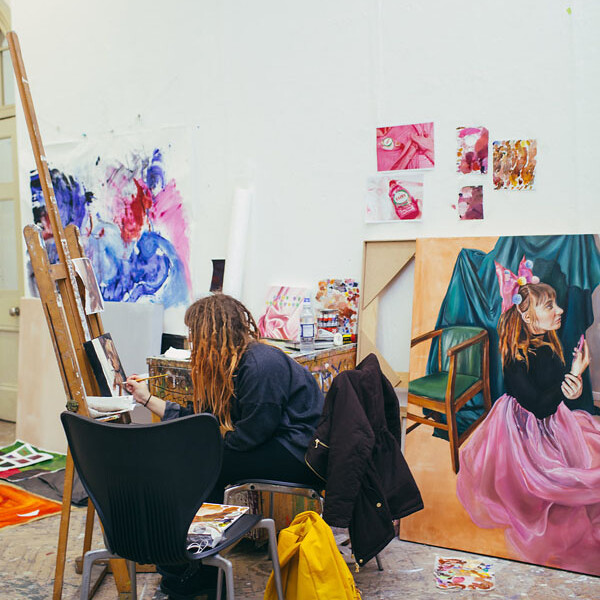
Arts and Education Practices - MA
Currently viewing course to start in 2025/26 Entry.
MA Arts and Education Practices is designed for the artist educator who wants to develop and refine their skills in working with others through artistic practice. The course aims to engage students with education as a practice of freedom and as a site of growth and transformation.
- Level Postgraduate Taught
- Study mode Full Time/Part Time
- Award MA
- Start date September 2025
- Fees View course fees
- Subjects
- Location Margaret Street
This course is:
Open to International Students
Overview
Financial awards are available for this course. Find out more and apply now
MA Arts and Education Practices is designed for the artist educator who wants to develop and refine their skills in working with others through artistic practice. The course aims to engage students with education as a practice of freedom (Hooks, Bell. 1994), and as a site of growth and transformation.
Based within Birmingham School of Art, we provide a unique platform to work as a community comprising of both experienced and aspiring artist educators engaging with the challenges and rewards of contemporary creative education. Working with specialists, you will connect with the diverse contexts in which creative education takes place: community projects, artist-led spaces, galleries, schools, colleges, universities, and peer-to-peer and family-led learning.
The course embeds skills to enable you to work across projects exploring the creative pedagogical models that inform both artistic practice and teaching and learning. You will explore the potential for freelance and permanent employment in creative education to enhance your own practice equipping you with specialist skills to use in the world.
Focus is given to self-development through collaborative work and exploring spaces of lifelong learning and creative pedagogical models. Your studies will engage with the potential for artistic practice to inform teaching and learning and how in turn work can be informed by your own experiences and engagements with pedagogy.
What's covered in this course?
On MA Arts and Education your studies will consider past, current and future creative practices and develop projects and programmes of learning in diverse contexts. Throughout your studies there are opportunities to connect with and expand your knowledge of your creative field through collaboration, live projects, and visits to explore educational situations and projects. The course ethos is one of facilitation, mentoring and collaboration, seeking to model a critical pedagogy where dialogue and mutual enquiry are emphasised.
Your independent research will lead to a professional project that can be focused through educational models, workshops, creative practice and encounters that inform and are responsive to art educational contexts and workplaces. Throughout the course, there are opportunities to develop professional skills in artist-led education through engagement with partners in creative education in art galleries, artist-run projects, schools, colleges and universities, including Ikon Gallery, Eastside Projects, Turves Green School and STEAMhouse.
An MA in Arts and Education Practices equips you with the skills to work in diverse roles and fields in creative education: as a self-employed arts professional, within creative compulsory and post-compulsory arts education, in the gallery and museum sector, as researcher and creative producers. You may choose to pursue further the research you developed on the course through a PhD.
Recent course alumni have worked with Central Saint Martins, Eastside Projects, Freelands Foundation, Grand Union, GRAIN, Ikon Youth Programme, Ikon Gallery, The Institute of International Visual Arts, Milton Keynes Art Centre, Multistory, New Art Gallery Walsall, Nishkam High School, The Barber Institute, The Gap Arts Project, The National Gallery, and Wolverhampton University.
Studying on MA Arts and Education Practices was a great privilege as the course allowed me time and space to reflect upon and revisit my art practice, as well as research my developing interest in faith schools and alternative arts education. Over the course of the year, I experimented with various materials and processes and felt the independence of the course was integral to achieving success.
Navi Kaur
Why Choose Us?
- This is a unique professional development opportunity at the intersection between art practice and educational theory.
- The MA Arts and Education Practices has a significant international reputation with alumni in over 20 countries worldwide, with strong educational profiles and working in a range of institutions and organisations.
- We work with each individual student to develop a route through the course to match their aspirations.
- Our students practice as artists, gain promotion within the field of education, pursue research or take a sideways step into another arts education related context.
- You will be supported by a highly professional staff team, doctoral researchers, technical demonstrators and artists in residence in a innovative, creative and supportive environment.
- Birmingham School of Art is an internationally recognised centre of excellence for art-based learning and research. We have a unique art education archive relating to the Arts and Crafts Movement, and Marion Richardson, amongst others.
- The course is based at Birmingham School of Art (Margaret Street), a fine example of Venetian Gothic architecture and an impressive purpose built Grade I listed art school.
OPEN DAY
Join us for an Open Day where you'll be able to learn about this course in detail, chat to students, explore our campus and tour accommodation. Booking isn't open for this event yet, register your interest and we'll let you know as soon as booking goes live.
Next Event: 28 June 2025
Entry Requirements
Essential requirements
Applicants are normally expected to have a minimum of a 2:2 honours degree, or equivalent, in an appropriate subject, and/or previous or concurrent experience in the arts and/or education.
We also welcome applications from individuals who may not satisfy the normal entry requirements, but have equivalent professional or life experience.
Applicants will also need to submit a good portfolio.
Applying with international qualifications
See below for further information on applying as an international student.
If you have a qualification that is not listed, please contact us.
Fees & How to Apply
UK students
Annual and modular tuition fees shown are applicable to the first year of study. The University reserves the right to increase fees for subsequent years of study in line with increases in inflation (capped at 5%) or to reflect changes in Government funding policies or changes agreed by Parliament. View fees for continuing students.
Award: MA
Starting: Sep 2025
- Mode
- Duration
- Fees
- Full Time
- 1 year
- £9,190 in 2025/26
- Full Time
- 18 months (including Professional Placement - see below*)
- £10,110 in 2025/26
- Part Time
- 2 years
- Show fees
- £1022 per 20 credits
- Year 1 - 100 credits
- Year 2 - 80 credits
Fees for Part-time students
This course can be studied on a Part-time study basis. The cost per year of study is based on credit requirements for that year.
International students
Annual and modular tuition fees shown are applicable to the first year of study. The University reserves the right to increase fees for subsequent years of study in line with increases in inflation (capped at 5%) or to reflect changes in Government funding policies or changes agreed by Parliament. View fees for continuing students.
Award: MA
Starting: Sep 2025
- Mode
- Duration
- Fees
- Full Time
- 1 year
- £18,600 in 2025/26
- Full Time
- 18 months (including Professional Placement - see below*)
- £20,460 in 2025/26
Application deadlines
We advise you to apply early to allow sufficient time for you to prepare to start your studies in September. Please apply by Friday 18 July to allow time to arrange accommodation, student finance and visas where required.
Late applications will be accepted where places are still available, but please note that Welcome Week begins on Monday 15 September 2025, and teaching begins on Monday 22 September 2025. International students are invited to arrive from Monday 8 September 2025.
To find out more, see our application timeline.
*Professional Placement option
The Professional Placement version of the course is optional and is offered as an alternative to the standard version of the course.
This will allow you to complete a credit bearing, 20 week Professional Placement as an integral part of your Master’s Degree. The purpose of the Professional Placement is to improve your employability skills which will, through the placement experience, allow you to evidence your professional skills, attitudes and behaviours at the point of entry to the postgraduate job market. Furthermore, by completing the Professional Placement, you will be able to develop and enhance your understanding of the professional work environment, relevant to your chosen field of study, and reflect critically on your own professional skills development within the workplace.
You will be responsible for finding and securing your own placement. The University, however, will draw on its extensive network of local, regional and national employers to support you in finding a suitable placement to complement your chosen area of study. You will also benefit from support sessions delivered by Careers+ as well as advice and guidance from your School.
Placements will only be confirmed following a competitive, employer-led selection process, therefore the University will not be able to guarantee placements for students who have registered for the ‘with Professional Placement’ course. All students who do not find a suitable placement or do not pass the competitive selection process will be automatically transferred back to the standard, non-placement version of the course.
Portfolio guidance
If you receive an offer to study this course, you will be required to submit a portfolio. We ask that this is submitted within four weeks of receiving your offer.
Please see our portfolio guidance page for tips on putting your portfolio together.
Portfolio guidance
If you receive an offer to study this course, you will be required to submit a portfolio. We ask that this is submitted within four weeks of receiving your offer.
Please see our portfolio guidance page for tips on putting your portfolio together.
Personal statement
You’ll need to submit a personal statement as part of your application for this course. This will need to highlight your passion for postgraduate study – and your chosen course – as well as your personal skills and experience, academic success, and any other factors that will support your application for further study.
If you are applying for a stand alone module, please include the title of the module you want to study in your Personal Statement.
Not sure what to include? We’re here to help – take a look at our top tips for writing personal statements and download our free postgraduate personal statement guide for further advice and examples from real students.
Course in Depth
Modules
In order to complete this course you must successfully complete all the following CORE modules (totalling 160 credits):
Narratives in Creative Pedagogy aims to convey the global exchanges, models and dialogues present in art and design education. This module draws from diverse historical and contemporary perspectives and sites of creative education, exploring the relationship between creativity, voice and the influence of broad educational beliefs upon the nature of art education practices.
This module introduces you to creative research methods and methodologies used in arts and design production. The focus here is on research through practice, where practice itself serves a research purpose. Through the analyses and synthesis of appropriate research tools you will deepen understanding of your own work, whilst querying what it is you might research and how you might achieve your aim.
Collective, collaborative and pedagogic art practices address the shrinking spaces for art education and are re-shaping the possibility for education to happen differently. In our current global political and economic climate, the place of art within formal educational contexts is in flux, causing us to revisit our assumptions about: what art education can be, why it is important to all, how we can engage with others through creativity and the models of practice we can share.
The purpose of this module is to enable you to undertake a sustained, in-depth and theoretically informed research project exploring an area that is of personal interest to you. The outcome may take the form of a written dissertation/ practical outcome with accompanying reflective, critical and contextual material or negotiated equivalent.
In order to complete this course you must successfully complete at least 20 credits from the following indicative list of OPTIONAL modules.
This module provides an opportunity for you to apply your knowledge and skills to an external, professional brief. The brief will be ‘real’, set in negotiation with an external client/agency/community, or it may be a simulation, inspired by a typical professional scenario you might experience in a work situation. The brief will enable you to apply your discipline-specific skills broadly, collaborating with your fellow students and, where relevant, across disciplines and with other stakeholders.
Creative careers often lead individuals on unexpected journeys, traversing diverse paths. Recognizing and seizing opportunities becomes pivotal in shaping a fulfilling portfolio career—one that harnesses your creative abilities while sustaining your livelihood. Whether you’re crafting artistic artifacts, performing, providing services, or offering consultancy, the art of promoting and pitching ideas lies at the heart of an independent, entrepreneurial journey.
Central to this experience is a 70-hour work placement, which you can complete either in a concentrated block or spread out over the duration of the module. During this placement, you’ll have the opportunity to develop your professional attributes and subject-specific skills. To closely align with real-world job market conditions, you should expect to prepare a current and relevant CV, attend interviews, conduct research in order to source your own placement.
Support will be available from academic staff and the ADM Careers+ service to assist you in securing your placement.
Core modules are guaranteed to run. Optional modules will vary from year to year and the published list is indicative only.
Professional Placement
In order to qualify for the award of MA Arts and Education Practices with Professional Placement, a student must successfully complete all of the Level 7 modules listed above as well as the following Level 6 module:
This module is designed to provide you with the opportunity to undertake a credit bearing, 20-week Professional Placement as an integral part of your Master’s Degree.
The purpose of the Professional Placement is to improve your employability skills which will, through the placement experience, allow you to evidence your professional skills, attitudes and behaviours at the point of entry to the postgraduate job market. Furthermore, by completing the Professional Placement, you will be able to develop and enhance your understanding of the professional work environment, relevant to your chosen field of study, and reflect critically on your own professional skills development within the workplace.
Download course specification
Download nowEmployability
Enhancing your employability skills
Studying an MA will help you to pursue or develop your career in a range of related professions across the educational sector and creative industries. This course will help to enhance your skillset and employability and either progress in your existing role or achieve your career ambitions in a new direction.
Many of our graduates have achieved regional, national and international recognition as professional artist educators and professionals in the creative industries sector.
Several modules on this course have been specifically designed to equip you with valuable transferable skills, for example Contemporary Curatorial Practice; Small Arts Business Set Up and Creative Publishing and Public Dissemination. These transferable skills include:
- Thinking in a creative, imaginative and speculative manner
- Demonstrating communication and presentation skills in practical, written and verbal forms
- Demonstrating adaptability and flexibility in a range of contexts
- Reflecting and communicating in an articulate, informed, confident and effective manner
- Working independently while demonstrating initiative and self-reliance
- Demonstrating motivation, organisation, planning and effective strategising skills
- Showing a capacity for good time management
- Actively linked with up-to-date local and regional opportunities.
We maintain excellent connections with major city centre institutions such as Birmingham Museums and Art Gallery (BMAG), Selfridges, Birmingham City Council, New Art West Midlands and Digbeth First Friday to name but a few.
Placements
Placements are one of the possible ways of fulfilling your modules and many of our students have chosen this route. There is scope for placements with a number of organisations in the city and beyond, however it is your responsibility to plan and organise your placement with the organisation you wish to work with.
Placements are a great opportunity to gain insight into how an organisation works and your reflection on their activities can be useful to them as you develop your research. Placements also give you the chance to meet and network with people in the education sector and creative industries. Our tutors are available to guide you through this process.
Navi Kaur
Artist and Teacher of Art at Nishkam High School
"Studying on the MA Arts and Education Practices programme was a great privilege as the course allowed me time and space to reflect upon and revisit my art practice, as well as research my developing interest in faith schools and alternative arts education, particularly within gallery settings and Punjabi schools situated in Gurdwaras (Sikh temples). Over the course of the year, I experimented with various materials and processes and felt the independence of the programme was integral to achieving success, as this encouraged me to approach galleries and organisations in the local arts community to share and experiment new works. This led to my first solo show at The GAP Arts Project and a number of student-led collaborative shows both at Margaret Street and an interim show at the CET Building in Coventry. The malleability of the course meant that I was able to balance my practice alongside my writing and was supported by my tutors to take up a research trip to Punjab - this developed into a short documentary film (Finding Space in Faith, 2018,), in which I explored my developing relationship with faith and family. This work was presented as my final project and exhibited as part of the end of year Masters degree show, Turn Out.
"After completing the course, I was fortunate enough to be supported by various arts organisations including Grand Union Gallery and Studios, with whom I am now a studio holder as part of their year-long BCU Graduate Residency Programme.
"Finding Space in Faith was widely shared across various platforms including on The White Pube's website as their November web resident. This led onto a collaborative exhibition at Stryx Gallery with a small number of my fellow Masters graduates, my second solo show at Recent Activity and more recently, exhibiting work at the UK's first Asian Woman Festival and becoming a member of Black Hole Club's 2019 cohort.
"Also after completing the course, I began my Initial Teacher Training and am currently working towards QTS with Staffordshire University on their PGCE Art and Design programme and am very privileged to be the newly appointed Teacher of Art at Nishkam High School from September 2019. I endeavour to be a positive role model for young people of colour in the community and create opportunities for them that were not accessible for me."
Laura Onions
Artist, Lecturer in Fine Art and Gallery Assistant at Grand Union.
"Having the space and time to identify how I wanted to practice as an artist through the contexts of education was important to me in selecting this MA. The expanded nature of the course enabled me to play within a critical framework that supported and challenged my practice and thinking. The most powerful aspect of this course was developing an educational ethos that has affected the way in which I interact and make decisions in my work with communities, galleries and teaching in Higher Education."
Melanie Woodhead
Course Leader of the Foundation Degree Fine Art & Contemporary Craft at Malvern School of Art.
"The MA Arts and Education Practices course was my ideal programme of study because it gave me fresh perspective on my position as an experienced Fine Art lecturer in Further and Higher Education, and in my role as a freelance art educator. As an artist it also challenged and shifted my creative identity towards unfamiliar territory. Since completing the course, I have started a new job as Course Leader of the Foundation Degree Fine Art and Contemporary Craft at Malvern School of Art, a role in which I constantly draw and reflect upon my experiences at BCU."
We offer part-time temporary positions within the University. This allows you to work while you study with us, fitting the job around your course commitments.
Facilities & Staff
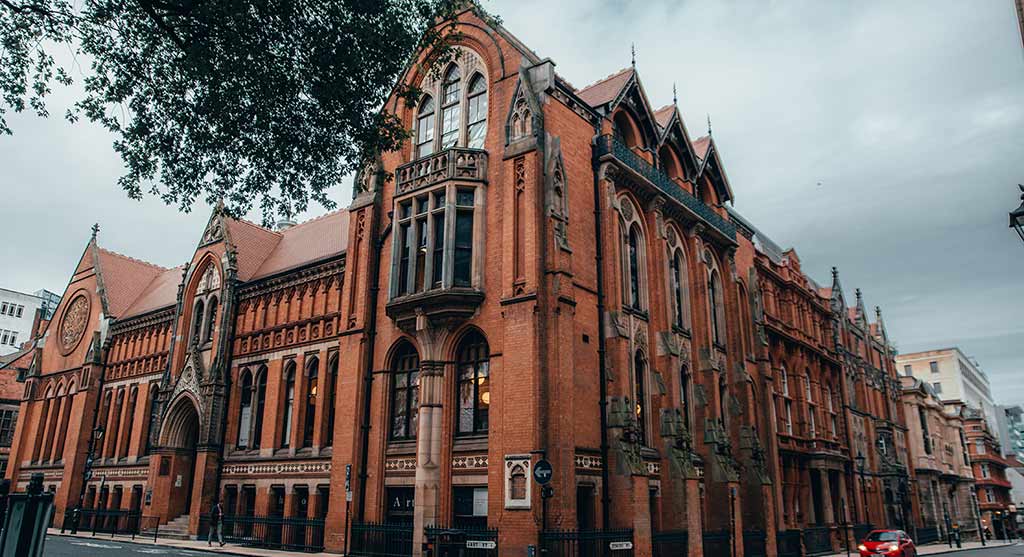
Our Facilities
We are constantly investing in our estate and are currently in the process of spending over £400 million on new learning facilities.
Birmingham School of Art (an impressive purpose built Grade 1 listed example of Venetian Gothic architecture) was the first major renovation project undertaken by the university (£5.5m refurbishment). The School provides an incredible resource for the production of art and its associated fields of study. The building has a range of facilities available including studios, workshops, specialist art and design library, bookable spaces and lecture/seminar rooms.
Our staff
Cathy Wade
Course Leader MA Arts and Education Practices
Cathy is an artist, writer and academic whose work is concerned with how art can be created and distributed in collaborative partnerships and through the creation of commons. Her work seeks to understand the experience of contemporary conditions through social practice and is realised as digital video, print, installation, public art, publication,...
More about Cathy